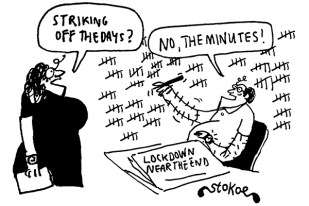When we think of those lurching moments last spring when it became clear that much of the world, not just one or two regions, would grind to a halt, for most of us it is anything but a fond memory. But the traders of Glencore probably remember the time differently: they saw it as an unprecedented opportunity to cash in.
Anticipating a global slowdown, they bought up all the space they could to store oil, including tankers capable of holding 3.2 million barrels. When the markets caught up with the scale of the pandemic, the price of oil dropped to zero and below, and in they swooped. They took the oil for free, stored it at sea, and sold it a few months later. While we worried about our livelihoods, Glencore’s traders made $1.3 bn trading energy.

This is just one of dozens of tales which fill Javier Blas and Jack Farchy’s swashbuckling history of a profession most of us would write off as unbearably boring: the life of a commodities trader. Grain, gold, iron and oil might be what make the world work, but few of us think of them as riveting subjects. That, it turns out, suits the traders just fine. When asked about the book during an interview with the authors, Ian Taylor, then CEO of one of the trading houses, said simply: ‘We would prefer you not to write it.’
The industry’s real story, at least as told here, reads more like a globe-spanning corporate thriller, full of intrigue and double-dealing. The traders jet in where no one else will go, signing deals to ship oil to Libyan rebels, produce aluminium within the Soviet Union, and befriend dictators in order to boost the cobalt trade. Inevitably, when the matter of ‘commissions’ (sometimes in the form of briefcases stuffed with cash) arises, the traders do not flinch — especially since, the book reveals, those foreign bribes were until recently a tax-deductible expense in the businesses’ Swiss headquarters.
The result is a book that changes how we see the world, often in horrifying ways. For instance, it describes the realisation by a group of teachers in Pennsylvania that their pensions helped further civil strife in Iraq, being used to fund Kurdish efforts to monetise oil fields which the US-backed government in Iraq claimed as their own.
Name a recent geopolitical crisis and you’ll find a commodities trader close to its heart
That was, if anything, the least of it: name a geopolitical crisis in the second half of the 20th century and you’ll find a commodities trader close to its heart — consistently amoral, looking to extract the most profit possible without falling foul of the law. It is suggested that traders helped spark the Arab Spring, accelerated the collapse of the Soviet Union and enabled more than one anti-Western military coup.
In the hands of lesser writers, this could easily slip into the realms of the conspiratorial — the sort of Facebook post about ‘globalists’ or ‘lluminati’ for which more than one British politician has found themselves apologising in recent years. But the book weaves together years of reporting experience in the field with access to many of the key figures in an industry dominated by huge characters. The men (it’s almost all men) are, on their own terms, wildly successful, rich, charming and well-travelled — so perhaps it’s unsurprising to detect the odd tone of admiration in the authors.
Many of the stories have been told before in this history of some five decades of activity, charting the rise and fall of different companies and leaders, some of whom — such as Marc Rich — were notorious in their day, thanks to their very visible falls from grace. But new insights and reporting mean that even seasoned observers will be amazed. If nothing else, the sheer sums of money at stake are mind-boggling.When we complain about executive pay, we are usually talking about millions, or tens of millions — since shareholders take the biggest slice of the pie. Not so with commodities: when Glencore became a publicly listed company, its top 13 partners were collectively worth $29 bn.
Where Blas and Farchy are not so convincing is in thinking that the time of these traders is passing; better information and tighter regulation and scrutiny are changing things, they claim. But it seems far from likely that such people will disappear either quickly or quietly.






Comments